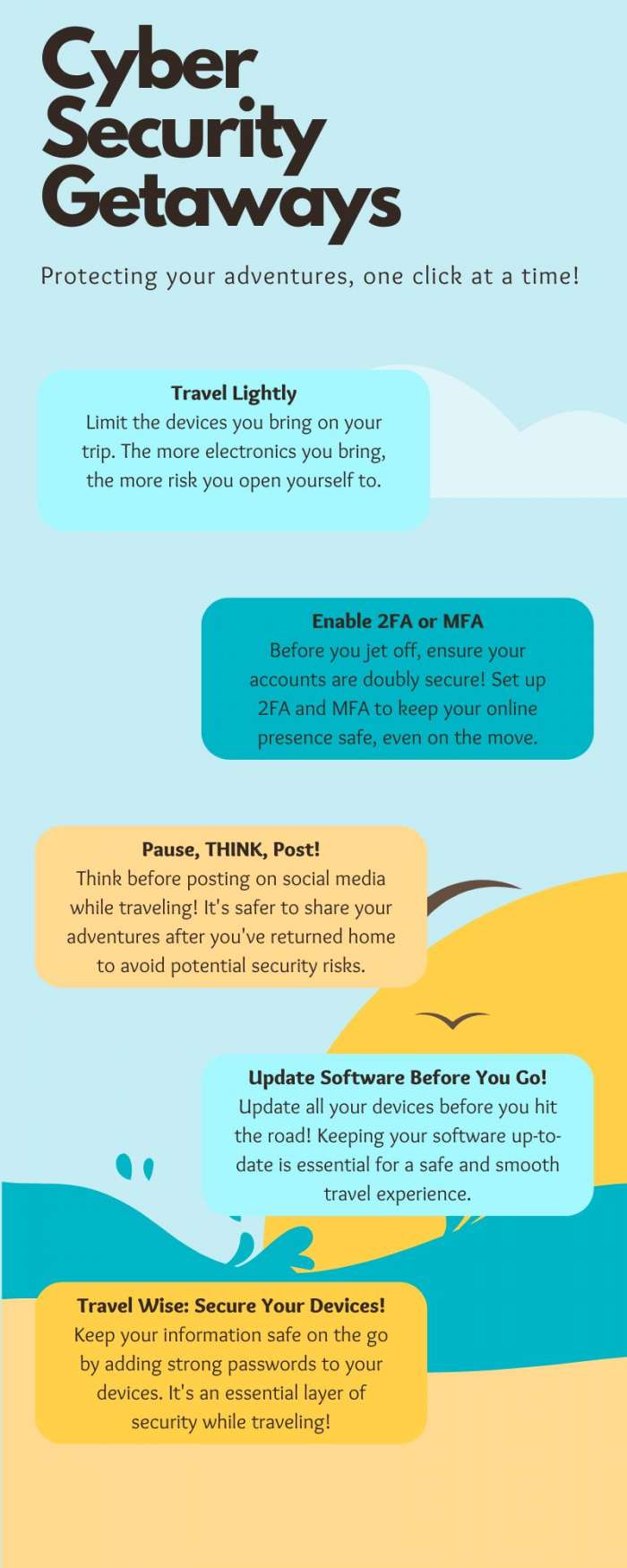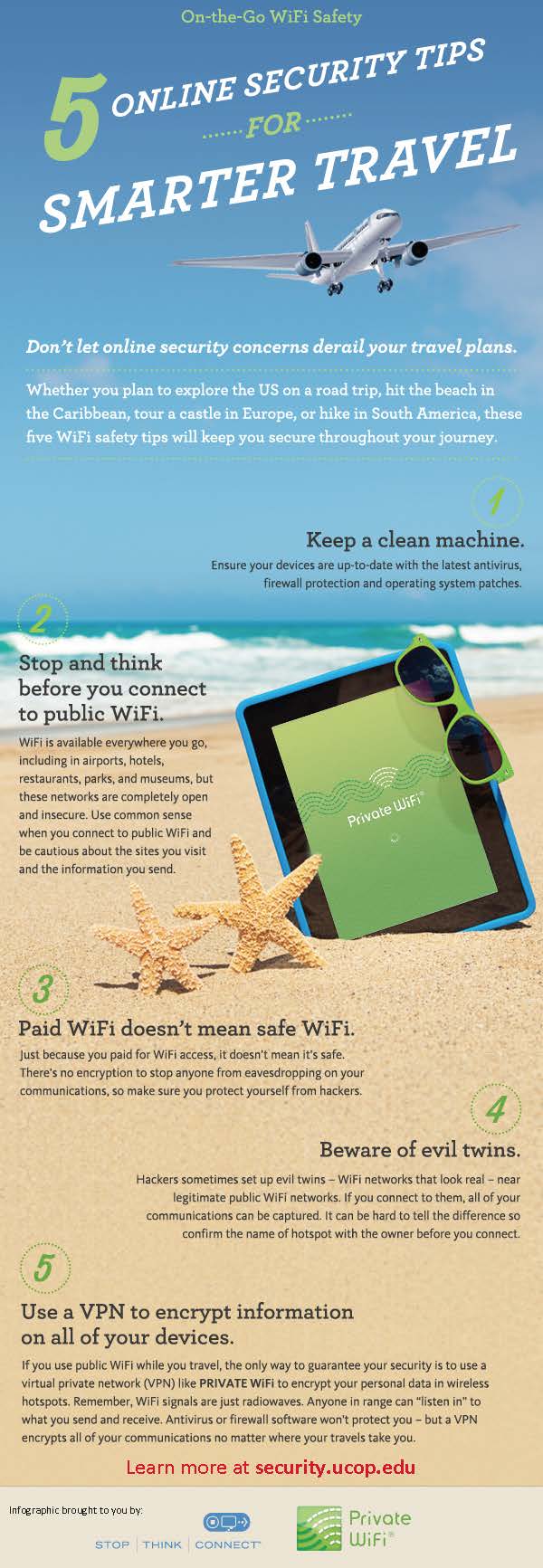Traveling opens up a world of experiences, but it also comes with online risks. Protecting your digital life while on the go is crucial.
When you travel, you often use public wi-fi, which can be a hotspot for hackers. Your personal information, like bank details and passwords, can be vulnerable. Ensuring online safety can save you from potential headaches and financial loss. Using a reliable VPN, like NordVPN, you can secure your internet connection and protect your privacy. NordVPN encrypts your data, hides your IP address, and offers high-speed connections. It’s easy to set up and works on multiple devices. Whether streaming your favorite shows or accessing restricted sites, NordVPN keeps your online activity safe and private. Secure your travels with NordVPN today. Click here to learn more about NordVPN.
Introduction To Online Safety For Travelers
Traveling can be an exciting adventure, but it poses online safety risks. Travelers often connect to public wi-fi, making them vulnerable to cyber threats. Understanding how to stay safe online while traveling is essential.
The Importance Of Staying Safe Online While Traveling
Travelers use public wi-fi networks at airports, hotels, and cafes. These networks are often unsecured, exposing users to potential cyber-attacks. Protecting personal data while traveling is critical.
Using a VPN like NordVPN can greatly enhance online security. It encrypts your internet connection, making it difficult for hackers to access your data. NordVPN also hides your IP address and location, adding an extra layer of privacy.
Common Online Threats Faced By Travelers
Travelers often face several online threats, including:
Man-in-the-Middle Attacks: Hackers intercept communication between your device and the internet.
Phishing Scams: Deceptive emails or websites trick users into providing personal information.
Unsecured wi-fi Networks: Public wi-fi can expose your data to cybercriminals.
Malware Infections: Malicious software can be installed on your device without your knowledge.
Using NordVPN can mitigate these risks. Its advanced AES-256 encryption secures your data. The Threat Protection feature blocks ads, trackers, and malware, providing additional security.
Feature | Benefit |
|---|---|
Next-Generation Encryption | Secures your data with AES-256 encryption. |
Global Server Network | Access over 7400 servers in 118 countries for stable connections. |
Multi-Device Support | One account secures up to ten devices. |
For more information about NordVPN, visit their official website.
Pre-travel Preparations For Online Safety
Traveling can expose you to various online threats. Preparing your devices and accounts is crucial for staying safe. Here are some essential steps to ensure your online safety before your trip.
Securing Your Devices
Ensure your devices are secure before you travel. Start by enabling password protection and biometric locks on your smartphones, tablets, and laptops. These features add an extra layer of security.
Use two-factor authentication (2FA) wherever possible.
Consider installing a reliable VPN service like NordVPN. It encrypts your internet connection, hiding your IP address and location.
Back up important data to a cloud service or external drive to prevent loss.
Updating Software And Applications
Keep your software and applications up-to-date to protect against vulnerabilities. Software updates often include security patches that fix known issues.
Update your operating system to the latest version.
Ensure all applications are updated, especially security apps.
Install a reliable antivirus and keep it updated for real-time protection.
An updated VPN service like NordVPN can also block malware and trackers, providing additional security.
Using Strong And Unique Passwords
Creating strong and unique passwords for your accounts is essential. Avoid using the same password across multiple platforms.
Use a combination of letters, numbers, and special characters.
Consider using a password manager like NordPass to generate and store secure passwords.
Regularly change your passwords to minimize the risk of unauthorized access.
Strong passwords and a strict no-log policy from VPN services like NordVPN keep your online activities private.
Feature | Benefit |
|---|---|
Next-Generation Encryption | Secures your data with advanced AES-256 encryption. |
Multi-Device Support | Secures up to ten devices with one account. |
Global Server Network | Access over 7400 servers in 118 countries. |
For more information, visit the NordVPN website.
Safe Browsing Practices While Traveling
Traveling often means connecting to unknown networks and using unfamiliar devices. To stay safe online, follow these essential browsing practices. These tips will help protect your personal information and ensure a secure internet experience.
Avoiding Public wi-fi Networks
Public wi-fi networks are convenient but risky. Hackers can easily access these networks and steal your data. Avoid connecting to public wi-fi whenever possible.
Use your mobile data instead of public wi-fi.
If you must use public wi-fi, avoid accessing sensitive information such as banking or personal accounts.
Disable automatic connections to wi-fi networks on your device.
Using Virtual Private Networks (VPNs)
A Virtual Private Network (VPN) like NordVPN is crucial for secure browsing. It encrypts your internet connection, hiding your IP address and location.
NordVPN offers:
Next-Generation Encryption: Uses advanced AES-256 encryption to secure your data.
No-Log Policy: Does not collect or store your private information.
Threat Protection: Blocks ads, trackers, and malware.
Multi-Device Support: One account can secure up to ten devices.
Setting up NordVPN is easy. Sign up, download the app, and tap the Quick Connect button. Enjoy uninterrupted Streaming and secure browsing on all your devices.
Recognizing And Avoiding Phishing Scams
Phishing scams are deceptive attempts to steal your personal information. These scams often look like legitimate emails or messages.
Check the Sender: Verify the sender’s email address or phone number.
Look for Red Flags: Common signs include spelling mistakes, urgent requests, and unfamiliar links.
Do Not Click Links: Avoid clicking links or downloading attachments from unknown sources.
If unsure, contact the company directly using their official contact information. Always stay vigilant and keep your personal information secure.
Feature | Description |
|---|---|
Next-Generation Encryption | Uses advanced AES-256 encryption to secure your data. |
Threat Protection | Blocks ads, trackers, and malware. |
No-Log Policy | Does not collect or store private information. |
Multi-Device Support | One account can secure up to ten devices. |
By following these safe browsing practices, you can enjoy a secure and worry-free travel experience. Stay informed and protect your online privacy with these simple steps.

Credit: www.enpass.io
Protecting Personal Information
Traveling can be an exhilarating experience, but it also exposes your personal information to various risks. Protecting your data is essential. Here are some practical tips to ensure your personal information remains secure while traveling.
Limiting Social Media Sharing
Sharing your travel plans on social media may seem fun, but it can also make you a thief target. Avoid posting real-time updates of your whereabouts. Instead, share your travel experiences after you return home.
Keep your social media profiles private. Only share your updates with trusted friends and family. This reduces the risk of strangers knowing your location or travel plans.
Using Encrypted Communication Apps
Communication apps with end-to-end encryption are vital for safeguarding your conversations. Apps like NordVPN offer secure, encrypted connections, keeping your messages private.
Encrypted communication apps protect your data from potential eavesdroppers. This is especially important when using public wi-fi networks, which are often less secure.
Storing Sensitive Information Securely
Keep sensitive information, such as passports and credit card details, secure. Use a password manager like NordPass to store and encrypt your passwords safely.
Store physical documents in a secure place, such as a hotel safe. For digital documents, use encrypted storage solutions like NordLocker. This ensures your data remains protected even if your device is lost or stolen.
Here’s a quick overview of how NordVPN can help protect your personal information:
Feature | Description |
|---|---|
Next-Generation Encryption | Uses advanced AES-256 encryption to secure your data. |
Strict No-Log Policy | Does not store private information, ensuring your privacy. |
Multi-Device Support | One account can secure up to ten devices. |
Global Server Network | Access to over 7400 servers in 118 countries for stable connections. |
Threat Protection | Blocks ads, trackers, and malware for safer browsing. |
With these tools and tips, you can travel safely, knowing your personal information is well-protected.
Keeping Financial Transactions Secure
Traveling opens up a world of new experiences, but it also comes with risks, especially regarding financial transactions. Ensuring the security of your financial activities while on the move is crucial. Here are some essential tips for securing your financial transactions during your travels.
Using Secure Payment Methods
Always use secure payment methods such as credit cards or digital wallets. These methods offer additional layers of security. Credit cards often have built-in fraud protection features. Digital wallets, like Apple Pay or Google Pay, use encryption to keep your information safe. Avoid using debit cards or cash as they offer less protection if lost or stolen.
Payment Method | Security Features |
|---|---|
Credit Cards | Fraud protection, encryption, and chargeback options |
Digital Wallets | Encryption, biometric authentication |
Debit Cards | Limited fraud protection |
Cash | No security features |
Monitoring Bank Accounts Regularly
It is vital to monitor your bank accounts regularly while traveling. Set up alerts for transactions over a certain amount. This way, you’ll be notified of any suspicious activity immediately. Use your bank’s mobile app to check your balance and review recent transactions.
Set up transaction alerts
Regularly check your balance
Review recent transactions
Recognizing Fraudulent Activities
Being able to recognize fraudulent activities is crucial. Look out for unfamiliar transactions or unauthorized withdrawals. If you notice any suspicious activity, report it to your bank immediately. Use tools like NordVPN to add an extra layer of security when accessing your bank accounts online.
Unfamiliar transactions
Unauthorized withdrawals
Report suspicious activity immediately
NordVPN offers features like advanced encryption and Threat Protection to secure online activities. This is especially useful when using public wi-fi networks during your travels. For more information, visit NordVPN.
What To Do If Your Device Is Lost Or Stolen
Traveling is exciting, but losing a device can quickly ruin the adventure. If your device is lost or stolen, follow these steps to protect your data and secure your accounts.
Immediate Steps To Take
Act quickly to minimize the damage. Here are the immediate steps you should take:
Lock your device remotely. Use the Find My Device feature on Android or Find My iPhone on iOS.
Change passwords for your important accounts. Start with email, banking, and social media.
Inform your mobile carrier. They can disable your SIM card to prevent misuse.
Notify your employer if the device contains any work-related information.
Remote Wiping And Device Tracking
If you cannot recover your device, consider remote wiping and tracking.
Remote Wipe: Use the remote wipe feature to delete all data from your device. This ensures sensitive information is not accessed.
Device Tracking: Enable tracking services. Tools like Find My Device and Find My iPhone can help locate your device.
These actions help protect your data and increase the chances of recovering your device.
Reporting To Authorities
Reporting the loss or theft to the authorities is crucial. Here’s what you need to do:
Contact Local Police: File a report with the local police. Provide details such as the device’s make, model, and serial number.
Inform Your Embassy: If you are abroad, notify your country’s embassy. They can assist with the necessary documentation.
Insurance Claims: If you have travel or device insurance, initiate the claim process. Please provide them with the police report and other required documents.
Reporting to authorities can help in the recovery process and may be necessary for insurance claims.
Using A Vpn For Extra Security
Using a VPN like NordVPN can add an extra layer of security. NordVPN encrypts your internet connection and hides your IP address, ensuring privacy and security even on public wi-fi.
Features of NordVPN:
Feature | Description |
|---|---|
Uninterrupted Streaming | Enjoy content without slowdown on all devices. |
Easy VPN Setup | Simple setup with just a few clicks. |
Next-Generation Encryption | Uses advanced A-256 encryption to secure data. |
Malware Protection | Includes Threat Protection to scan downloads for malware, block trackers, and hide ads. |
Strict No-Log Policy | Does not collect or store private information. |
Multi-Device Support | One account secures up to ten devices. |
Global Server Network | Access to over 7400 servers in 118 countries. |
With NordVPN, you can protect your online activity from third parties and ensure privacy, even if your device is lost or stolen.
Conclusion: Staying Vigilant For A Safe Journey
Stay vigilant to ensure a safe online experience while traveling. Protect personal information and avoid suspicious websites. Enjoy your journey with peace of mind.
Traveling can be an exhilarating experience, yet it’s vital to stay vigilant online. Safeguarding your personal information and maintaining online privacy should be a top priority. You can enjoy your travels without compromising security with the right tools and practices.
Recap Of Essential Online Safety Tips
Let’s revisit some essential online safety tips:
Always use a VPN like NordVPN to secure your internet connection.
Ensure your software and apps are up-to-date.
Avoid using public wi-fi without a VPN.
Enable two-factor authentication on all accounts.
Be cautious of phishing emails and suspicious links.
Back up important data regularly.
Using a VPN like NordVPN can protect your online activities. It offers advanced encryption, a no-logs policy, and threat protection to block malware and trackers.
Encouragement To Stay Informed And Prepared
Staying informed and prepared is key to online safety.
Action | Benefit |
|---|---|
Regularly check for updates on security best practices. | Stay ahead of potential threats. |
Use security tools like NordVPN. | Ensure encrypted and secure connections. |
Keep your devices’ security settings up-to-date. | Minimize vulnerabilities. |
You can navigate the digital world safely by consistently updating your knowledge and tools. NordVPN is a reliable option with its global server network and multi-device support. For further peace of mind, consider their 30-day money-back guarantee, ensuring you can try the service risk-free. Stay safe, stay informed, and enjoy your travels with confidence.

Credit: www.montclair.edu

Credit: security.ucop.edu
Frequently Asked Questions
What Are The 4 C’s Of Online Safety?
The 4 C’s of online safety are Content, Contact, Conduct, and Commerce. Protect yourself and your data online.
What Are The 4 R’s Of Online Safety?
The 4 R’s of online safety are Recognize, Refuse, Respond, and Report. Recognize threats, refuse risky interactions, respond to issues appropriately, and report any suspicious activities.
Is It Safe To Use wi-fi when travelling?
Using wi-fi while traveling can be safe if you take precautions. Avoid public networks for sensitive tasks. Use a VPN to protect your data. Keep your device’s security software updated.
What Are The 3 C’s Of Internet Safety?
The 3 C’s of Internet safety are Content, Contact, and Conduct. Monitor content appropriately, manage contacts to avoid strangers, and ensure respectful online conduct.
Conclusion
Stay safe while traveling by following these online safety tips. Always use strong passwords and enable two-factor authentication. Consider using NordVPN to secure browsing on public wi-fi. This VPN service offers advanced encryption and a no-logs policy. Protect your data and enjoy uninterrupted Streaming. Stay vigilant, stay safe, and enjoy your travels with peace of mind.
